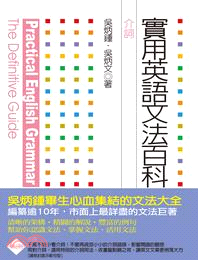再享89折,單本省下31元
商品簡介
吳炳鍾畢生心血集結的文法大全
編纂逾 10 年,市面上最詳盡的文法巨著
清晰的架構‧精闢的解說‧豐富的例句
幫助你認識文法、掌握文法、活用文法
第 6 冊-介詞
千萬不能小看介詞!不要再疏忽小小的介詞錯誤,影響閱讀的觀感
用對介詞、選用特別的介詞用法,收畫龍點睛之效,讓英文文章更俐落大方。
是高中生、大學生、研究生、國外留學生英文必備的參考書。
吳炳鍾認為,想要在國內學好英文是有捷徑的:跟著國內的好老師學習就是了。而在國內要學好英文文法,最好是閱讀國人編寫的英文文法書。因為國人教師和編者更透徹瞭解英文和中文的語言習慣及文法的異同,也更清楚國人學習英文的難點和易錯點,更容易幫助學習者掌握好的學習方法、抓住重點。
本書特色
力求「實用」
盡力結合中國人學習英文的實際需要,不將古老或罕見的用法納入本書。
採用「先詞法,後句法」的傳統文法編寫方法,這種編法讀者熟悉,且條理清楚,查閱省力,符合一般習慣。
力求「完整」
對文法規則的講解,內容詳細,重點突出。
例詞、例句豐富,有淺有深,兼顧了不同程度讀者的需要。
系統完整,在介紹傳統文法的同時,也包含了不少英美現代文法的新用法,及國內若干權威文法書之長。
作者簡介
曾任教於台灣大學、政治大學、輔仁大學,是國內最早推動英語教學的功臣,也是台灣電視史上主持英語教學節目的第一人。曾編輯辭典及電子辭典,受到當代年輕學子的歡迎。
吳教授一生著作豐富,聯經出版公司予以整理,出版「吳炳鍾英語教室」系列。已出版《英語發音》、《英文Q&A》、《英語基礎會話600》等作品。
吳炳文,1928年生。北京燕京大學新聞系畢業,曾任北京市第八十中學高級英語教師,(臺灣)英業達集團(北京)電子技術有限公司英語顧問,曾編著《中學英語語音自學手冊》(北京外文出版社出版)等書。
序
本書所以命名為《實用英語文法百科》,一是力求「實用」,即:盡力結合國人學習英文的實際需要,一般不將古老或罕見的用法納入本書;仍採用「先詞法,後句法」的傳統文法編寫方法,因此種編法國人讀者熟悉,且條理清楚,查閱省力,符合認識規律;對文法規則的講解,內容詳細,重點突出,例詞、例句豐富,針對性強並附有漢譯文,而且絕大部分用的是常用辭彙,簡明易懂,有淺有深,兼顧了不同程度讀者的需要。二是力求「完整」,即:系統性和完整性強,包含了各項常用的詞法和句法知識,兼顧了文體、口 語、常規和例外的用法,特別注意說明了英國和美國英文文法的不同之處;在介紹傳統文法的同時,吸收了不少英美現代文法的新成果,及國內若干權威文法專著之長。
當今經濟全球化已是大勢所趨,以兩岸三地為主的世界大華人圈之間的聯繫日益 緊密。多年來本人一直期望我們世界大華人圈的英文語言學者能很好地溝通,各地的英文 文法系統、文法術語能很好地融合,取長補短,相互借鑒。本書就是為了兼顧兩岸三地為 主的世界大華人圈的英文學習者的不同需要而編寫的。如句子的基本成分和基本句型,本 書採用了當代英文一些新的主張,即五種基本成分和七種基本句型,這恰好與大陸新的文 法著作一致。又如時態的種類,傳統文法分為十六類,包括「過去未來式」等過去未來時 態。而臺灣通常分為十二類,「過去未來式」不單列為一類,「would+原形動詞」的形式 只出現於間接引句中。實際上「過去未來式」不僅可用於間接引句中,也可用於一般的敘 述句的上下文中。因此本書採用了將時態分為十六類的傳統方法,以更好地說明複雜的文 法現象。這也與現在大陸的多數文法專著中的時態分類方法一致。
不僅臺灣與大陸、香港的英文文法術語中文釋義不盡相同,各地的各家說法也不盡一 致。如 continuative relative clause 有的譯為「補述的關係子句」,有的譯為「連續的定語從句」,或「接續的關係子句」,相比之下,「補述的關係子句」的譯法能更恰當 地表述此種關係子句的作用。在本書所附的「常用英文文法術語英漢對照表」中,特意註明了大陸的釋義與臺灣的異同之處,期望有助於今後各地英文文法術語譯法的篩選、融合。
在此,還要特別提到的是:本人得以集中精力順利地編成此書,是和內子林慧心女士多年來辛勤勞苦,無怨無悔,無微不至地照料我的生活起居,並給予精神上的安慰、支持分不開的;舍弟吳炳文和李婉瑩女士參加了策劃、編寫、校對,付出了艱辛的勞 動和心血。對此一併深表衷心感謝。
本書如有疏漏或不妥之處,務請專家和讀者指正。
吳炳鍾
2003 年 7 月 28 日
於舊金山
目次
前言
用法說明
第19章 分詞
1 概說
1.1 介詞的定義及特點
1.2 介詞從形式上的分類
1.2.1 單一介詞
1.2.2 分詞介詞
1.2.3 複合介詞
1.2.3.1 according to
1.2.3.2 along of
1.2.3.3 along with
1.2.3.4 alongside of
1.2.3.5 apart from/aside from
1.2.3.6 as for/as to
1.2.3.7 as of
1.2.3.8 because of
1.2.3.9 but for
1.2.3.10 down to
1.2.3.11 due to
1.2.3.12 except for
1.2.3.13 instead of
1.2.3.14 next to
1.2.3.15 opposite to
1.2.3.16 out of
1.2.3.17 over against
1.2.3.18 owing to
1.2.3.19 previous to
1.2.3.20 prior to
1.2.3.21 round about
1.2.3.22 save for
1.2.3.23 together with
1.2.3.24 up to
1.2.4 片語介詞
1.2.4.1 由「介詞+單數名詞+介詞」構成的片語介詞
1.2.4.2 由「介詞+複數名詞+介詞」構成的片語介詞
1.2.4.3 由「介詞+the+單數或複數名詞+介詞」構成的片語介詞
1.2.4.4 由「介詞+a/an+單數名詞+介詞」構成的片語介詞
1.3 介詞的受詞
1.4 介詞片語在句中的作用
1.4.1 介詞片語做名詞或代名詞的修飾語
1.4.2 介詞片語做補語
1.4.3 介詞片語作受詞
1.4.4 介詞片語做主詞
1.4.5 介詞片語做狀語
1.4.6 介詞片語做同位語
1.5 介詞的省略(omission of preposition)
1.5.1 副詞性受詞前的介詞常可被省略
1.5.2 「of+形容詞+名詞」結構中 of 的省略
1.5.3 動名詞前的介詞的省略
1.5.4 「with+冠詞或所有格+名詞+介詞片語」的結構中介詞的省略
1.5.5 以疑問詞引導的名詞子句作受詞時其前面的介詞的省略
1.5.6 形容詞或過去分詞之後和 that 子句之間的介詞的省略
1.5.7 在 that 子句之前「動詞+介詞」構成的片語動詞中介詞的省略
1.5.8 某些由「不及物動詞+介詞片語」構成的習慣用語中介詞的省略
1.5.9 重複的介詞(reduplicative prepositions)的省略
1.6 介詞與介副詞的區別
1.6.1 介詞與介副詞的一般區別
1.6.2 從受詞的位置來區別動詞之後的介詞和介副詞
1.7 介詞與連接詞的區別
1.8 介詞的位置
2 介詞從意義上的分類
2.1 表示伴隨的介詞(preposition denoting accompaniment)
2.1.1 with 表示伴隨時的用法,without 表示相反的意義
2.1.2 to 表示伴隨時的用法
2.2 表示一致或適合的介詞(preposition denoting concord or fitness)
2.2.1 with 表示一致或適合時的用法
2.2.2 to 表示適合或符合時的用法
2.2.3 for, in, on 表示一致或適合時的用法
2.3 表示原因的介詞(preposition denoting cause)
2.3.1 of, from, by, through, with, in, for 表示死亡原因時的異同
2.3.2 by, from, on, out of, through 在表示動機時的異同
2.3.3 介詞在其他場合表示原因時用法的異同
2.3.3.1 at 表示原因時的用法
2.3.3.2 by 表示原因時的用法
2.3.3.3 for 表示原因時的用法
2.3.3.4 from 表示原因時的用法
2.3.3.5 in 表示原因時的用法
2.3.3.6 of 表示原因時的用法
2.3.3.7 on 表示原因時的用法
2.3.3.8 over 表示原因時的用法
2.3.3.9 through 表示原因時的用法
2.3.3.10 with 表示原因時的用法
2.3.3.11 after 表示原因時的用法
2.3.3.12 beneath 表示原因時的用法
2.3.3.13 between 表示原因時的用法
2.3.3.14 片語介詞 because of, owing to,和 due to 表示原因時的用法
2.3.3.15 片語介詞 thanks to 表示原因時的用法
2.4 表示比較或對比的介詞(preposition denoting comparison or contrast)
2.4.1 介詞表示一般比較或對比時的用法
2.4.1.1 against 表示比較或對比時的用法
2.4.1.2 beside 表示比較或對比時的用法
2.4.1.3 to 表示比較或對比時的用法
2.4.1.4 with 表示比較或對比時的用法
2.4.1.5 vis-à-vis 表示比較或對比時的用法
2.4.1.6 by 表示比較或對比時的用法
2.4.2 表示等比的介詞(preposition denoting comparison of equality)
2.4.2.1 to 表示等比時的用法
2.4.2.2 with 表示等比時的用法
2.4.3 表示劣比的介詞(preposition denoting comparison of inferiority)
2.4.3.1 after 表示劣比時的用法
2.4.3.2 below, beneath 和 under 表示劣比時的用法
2.4.3.3 behind 表示劣比時的用法
2.4.3.4 to 表示劣比時的用法
2.4.4 表示優比的介詞(preposition denoting comparison of superiority)
2.4.4.1 above, over, beyond 和 past 表示優比時的用法
2.5 表示讓步的介詞(preposition denoting concession)
2.5.1 片語介詞 in spite of 表示讓步時的用法
2.5.2 notwithstanding 表示讓步時的用法
2.5.3 despite 表示讓步時的用法
2.5.4 for 和 with 表示讓步時的用法
2.5.5 其他介詞或片語介詞表示讓步時的用法
2.6 表示條件的介詞(preposition denoting condition)
2.6.1 片語介詞 in case of 和 in the event 表示條件時的用法
2.6.2 given 表示條件時的用法
2.6.3 with 表示條件時的用法
2.6.4 表示否定條件的介詞 without 的用法
2.6.5 表示否定條件的片語介詞 but for 和 except for 的用法
2.6.6 其他表示否定條件的介詞的用法
2.7 表示程度的介詞(preposition denoting degree)
2.7.1 at 表示程度時的用法
2.7.2 to 表示程度時的用法
2.7.3 表示程度的片語介詞
2.7.4 of, from, with, to 和 die 連用時表示程度的用法
2.8 表示方向的介詞(preposition denoting direction)
2.8.1 in, inside, into, out of, on, onto 表示方向時的異同
2.8.2 to, toward/towards, for 表示方向時的異同
2.8.3 up, down 表示方向時的用法
2.9 表示除外的介詞(preposition denoting exclusion)
2.9.1 except, but, save, beyond, excepting 表示除外時用法的異同
2.9.2 except, but, except for, but for 表示除外時用法的異同
2.9.3 except, but, besides, aside from/apart from 表示除外時用法的異同
2.9.4 其他介詞表示除外時的用法
2.10 表示相關的介詞(preposition denoting interrelation)
2.10.1 about, of, on 表示提及、涉及或關於時用法的異同
2.10.1.1 about 表示相關時的用法
2.10.1.2 of 表示相關時的用法
2.10.1.3 on 表示相關時的用法
2.10.2 其他介詞表示相關時的用法
2.11 表示方式的介詞(preposition denoting manner)
2.11.1 by, in, on 表示乘某種交通工具或行進方式時的異同
2.11.2 by, in, with, from, of, out of, toward 表示「用」時的異同
2.11.2.1 by 表示「用……」的場合
2.11.2.2 with 指動作的方式時表示「用……」的場合
2.11.2.3 in 表示「用……」的場合
2.11.2.4 toward(s)可表示用於、用作
2.11.3 介詞在其他場合表示方式、方法時的區別
2.11.3.1 by 可表示憑(或靠),以……等意義
2.11.3.2 in 可表示行為(時)的情緒、方式、方法、風格、風度、態度
2.11.3.3 with 可表示行為(時)的情緒、方式、方法、態度
2.11.3.4 without 可表示「不」、「毫不」
2.11.3.5 on 可表示「憑」、「靠」、「交易的方式」、「行為的方法」
2.11.3.6 through 可表示「憑」、「靠」、「經由某一媒介」、「途經」
2.11.3.7 after 可表示按照、仿照等
2.11.3.8 like 可表示像、如同等
2.11.3.9 as 可表示作為……,以……
2.11.3.10 by means of 表示藉助於等
2.11.4 by, with 表示「被……」時的區別
2.12 表示度量或標準的介詞(preposition denoting measure or standard)
2.12.1 表示速度的介詞(preposition denoting speed)
2.12.2 表示價值或價格的介詞(preposition denoting value or price)
2.12.2.1 at 表示價值或價格時的用法
2.12.2.2 for 表示價值或價格時的用法
2.12.2.3 off 表示價格時的用法
2.12.3 by 表示度量或標準時的用法
2.12.4 表示以某種標準衡量的介詞
2.12.4.1 for 表示「就……來說」等
2.12.4.2 by 表示「按照」、「根據」等
2.12.4.3 to 表示「按照」、「依照」、「對……來說」
2.12.4.4 from 表示從……來推論、判斷等
2.12.4.5 in 用於某些習慣用語中,用來推論、判斷
2.12.4.6 with 可表示對……來說等
2.12.4.7 on, under 可表示根據等
2.12.4.8 according to 可表示根據或按照……,依……而定
2.12.4.9 considering 可表示「就……而論」等
2.12.4.10 in the case of 表示就……而論等
2.13 表示地方的介詞(preposition denoting place)
2.13.1 at, on, in 表示地方時的區別
2.13.1.1 at 表示空間的某一點、較小的地方或在某處附近
2.13.1.2 in 表示在較大的地方或含有空間意味的地方
2.13.1.3 on 表示(與……表面相接觸)在……之上或在廣闊的面上等
2.13.2 in, on, to, by, up, down 表示方位時的區別
2.13.2.1 in, by 表示方位時的用法
2.13.2.2 on 表示方位時的用法
2.13.2.3 與 of 連用 in 表示方位時的用法
2.13.2.4 to 表示方位時的用法
2.13.2.5 up, down 表示方位時的用法
2.13.3 above, over 表示方位時的異同
2.13.4 below, under, beneath, underneath 在表示方位時的異同
2.13.5 beside, by, near, next to 表示地方時的異同
2.13.6 before, in front of 表示地方時的異同
2.13.7 behind, after 表示地方時的異同
2.13.7.1 behind 表示地方時的用法
2.13.8 from, off, of, by, through, past, along 等表示地方時的區別
2.13.8.1 from 表示「自」、「從」時的用法
2.13.8.2 off 表示從某處的表面上離開或脫離
2.13.8.3 from, off, of 表示距離某處多遠時的區別
2.13.8.4 by, through 表示經過時的區別
2.13.8.5 past 可表示從旁經過、超過等
2.13.9 along, up, down 可表示沿著等
2.13.10 across, over, beyond 表示地方時的用法
2.13.11 around, round, about 在表示地方時的異同
2.13.12 between, among, amidst 表示地方時的區別
2.13.12.1 between 表示在……之間
2.13.12.2 among, amidst, amid 表示在三者或三者以上之間等
2.13.13 against, opposite 表示地方時的區別
2.13.14 inside, within, outside, without 表示地方時的區別
2.14 表示具有的介詞(preposition denoting possession)
2.15 表示目的的介詞(preposition denoting purpose)
2.15.1 表示目的的介詞 for 的用法
2.15.2 to 表示目的時的用法
2.15.3 against 表示目的時的用法
2.15.4 有些由 for, in, on, with, by 引導的片語介詞也可表示目的
2.16 表示屬性的介詞(preposition denoting quality)
2.16.1 of 用於「名詞+of+名詞」的結構中表示品質、特徵、屬性
2.16.2 of 用於其他場合表示某人或某物的品質、特徵、屬性
2.17 表示比率或比例的介詞(preposition denoting ratio or proportion),表示「比率、比例」的介詞有 for, to, in, off。
2.17.1 for 表示比率或比例時的用法
2.17.2 to 表示比率或比例時的用法
2.17.3 in 表示比率或比例時的用法
2.18 表示關係的介詞(preposition denoting relation)
2.18.1 of 表示所屬關係等意義時的用法
2.18.2 for 表示關係時的用法
2.18.3 to 表示關係時的用法
2.19 表示方面的介詞(preposition denoting respect)
2.19.1 to 表示方面時的用法
2.19.2 about 表示方面時的用法
2.19.3 at 表示方面時的用法
2.19.4 in 表示方面時的用法
2.19.5 of 表示方面時的用法
2.19.6 on 表示方面時的用法
2.19.7 for 表示方面時的用法
2.19.8 with 表示方面時的用法
2.19.9 after 表示方面時的用法
2.20 表結果的介詞(preposition denoting result)
2.20.1 to 表示結果時的用法
2.20.2 into 表示結果時的用法
2.20.3 out of 表示結果時的用法
2.20.4 in 表示結果時的用法
2.21 表示來源或根源的介詞(preposition denoting origin or source)
2.21.1 from, out of, in, with 和某些動詞搭配表示「來源」、「根源」
2.21.2 from 或 of 置於 borrow, learn 等動詞後表示來源時意義相同
2.21.3 在 come 後接 from, of 表示不相同的意義
2.21.4 在下列場合表示由來時用 of
2.22 表示狀態或情況的介詞(preposition denoting state or condition)
2.22.1 about 表示狀態和情況時的用法
2.22.2 at 表示狀態和情況時的用法
2.22.3 in 表示狀態和情況時的用法
2.22.4 into 表示狀態和情況時的用法
2.22.5 out of 表示狀態和情況時的用法
2.22.6 on 表示狀態和情況時的用法
2.22.7 off 表示狀態和情況時的用法
2.22.8 under 表示狀態和情況時的用法
2.22.9 with 表示狀態和情況時的用法
2.22.10 of 表示狀態和情況時的用法
2.23 表示代替或充當的介詞(preposition denoting substitution or acting as)
2.23.1 表示代替、代表或代理的介詞(preposition denoting substitution or representation)
2.23.1.1 for 表示代替、代表、代理等意義時的用法
2.23.1.2 instead of 表示代替等意義時的用法
2.23.1.3 in lieu of 表示代替等意義時的用法
2.23.1.4 in place of, in one’s place of 表示代替等意義時的用法
2.23.1.5 on/in behalf of 等表示代表時的用法
2.23.2 表示當作、看作或擔任、充當的介詞(preposition denoting regarding as or acting as)
2.23.2.1 as 表示當作、看作或擔任、充當等時的用法
2.23.2.2 for 表示當作、作為、做或擔任等時的用法
2.24 表示贊成或反對的介詞(preposition denoting approval or objection)
2.24.1 表示贊成或支持的介詞(preposition denoting approval or support)
2.24.1.1 for 可表示贊成、支持等
2.24.1.2 with 可表示贊成、支持、同意等
2.24.1.3 behind 可表示贊成、支持等
2.24.1.4 表示贊成、支持等的片語介詞
2.24.2 表示反對或違反的介詞(preposition denoting objection or contravention)
2.24.2.1 against 可表示反對、不贊成
2.24.2.2 表示反對或不利的片語介詞
2.25 表示時間的介詞(preposition denoting time)
2.25.1 at, on, in 在表示時間時的區別
2.25.1.1 at 表示時間時的用法
2.25.1.2 on 表示時間時的用法
2.25.1.3 in 表示時間時的用法
2.25.1.4 in time 與 on time 用法的比較
2.25.2 in 和 within 在表示時間時的區別
2.25.3 in, during, for 在表示時間時的異同
2.25.4 in, for 和 after 在表示時間時的區別
2.25.5 in, during 和 by 在表示時間時的異同
2.25.6 before 和 by 在表示時間時的區別
2.25.7 during, through, throughout, over 在表示時間時的異同
2.25.8 from, since 在表示時間時的區別
2.25.9 from... to/till, through, between 在表示時間時的異同
2.25.10 till, until, up to/up till/up until 在表示時間時的異同
2.25.11 over, past, after, beyond, behind 在表示時間時的異同
2.25.12 to, before, of, till 在表示時間時的異同
2.25.13 around, round(about), about 在表示時間時的異同
2.25.14 near, toward(s)在表示時間時的異同
2.25.15 of 在表示時間時的用法
2.26 對待介詞(preposition denoting treatment)
2.26.1 to, toward(s)可表示對於或對待
2.26.2 by 可表示對於或對待
2.26.3 with 可表示對於或對待
2.26.4 of 可表示對於
2.26.5 on 可表示對於
2.26.6 in 可表示對於
2.26.7 about 可表示對於
2.26.8 for 可表示對於
2.26.9 against, at 可表示對於
文法索引
參考書目
書摘/試閱
1.1 介詞的定義及特點
介詞又稱前置詞, 是用以表示它的受詞同句中其他字詞之間的關係的字。介詞是虛詞, 不能單獨充當句子成分, 它的後面須接名詞或名詞相等語作它的受詞, 構成介詞片語, 才能充當句子中的某種成分。
◎ The man near the gate is Tom's father.
在大門附近的那人是湯姆的父親。
(介詞 near 表明它的受詞 the gate 和 the man 的地點關係。 介詞片語 near the gate 做名詞 man 的修飾語, 對 man 加以限定。)
◎ He left after a week.
一個星期之後他走了。
(介詞 after 表明它的受詞 a week 和 動詞 left 的時間關係。 介詞片語after a week 做動詞 left 的修飾語, 作時間副詞。)
◎ I was overjoyed at the sight.
見到此景我非常高興。
(介詞 at 表明它的受詞 the sight 和 was overjoyed 的因果關係。介詞片語 at the sight 作 was overjoyed 的原因副詞。)
1.2 介詞從形式上的分類
介詞從其構成的形式來分, 有單一介詞 (simple preposition)、分詞介詞(participial preposition)、複合介詞 (compound preposition), 以及片語介詞(phrasal preposition) 四類。
1.2.1 單一介詞
單一介詞就是一個字的介詞, 這類介詞有 aboard, about, above, across, after, against/gainst/'gainst, along, amid/amidst, among/amongst, around, as, astride, at, athwart, bar, before, behind, below, beneath/neath/'neath, beside, besides, between/'tween, betwixt/'twixt, beyond, but, by, despite, down, during,ere, ex, except, for, from, in, inside, into, less, like, minus, near, next, notwithstanding, of, off, on, onto, opposite, out, outside, over, past, per, plus, round, save, since, than, through, till, to, toward(s), under, underneath, until, unto, up, upon, with, within, without。
1.2.2 分詞介詞
分詞介詞主要是由動詞的現在分詞轉變來的以 -ing 結尾的介詞, 如barring, concerning, considering, excepting, failing, following, including, judging, pending, regarding, respecting, saving, touching, wanting 等。此外, 還有由過去分詞轉變來的介詞, 如 past, given, granted 等。
◎ Nobody knows the secret, barring you and me.
除了你和我, 沒有人知道此秘密。
◎ We have received the letter concerning your complaint.
我們已收到了關於你投訴的信件。
◎ She is quite capable, considering her age.
就她的年齡而言, 她是相當能幹的。
◎ Everybody must obey the law, not excepting the president.
人人都必須遵守法律, 總統也不例外。
◎ Failing good weather, the party will be held indoors.
如果天氣不好, 聚會便在室內舉行。
◎ Following the speech, there will be a few minutes for questions.
講演結束之後, 將有幾分鐘可以提問題。
◎ A new car of this kind costs two hundred thousand dollars, including purchase tax.
一輛這種新車包括購物稅在內, 價格為二十萬美元。
◎ Judging by the look on his face, he doesn't like this picture much.
從他臉上的表情看, 他不很喜歡這幅畫。
◎ Judging from previous experience, he will be late.
從以往的經驗來看, 他將要遲到。
◎ The money must remain in the hands of the trustees, pending a judicial ruling on the matter.
這錢必須繼續由受託人保管,直到對這件事作出司法判決為止。
◎ She spoke to me regarding her future.
她對我談及她的未來。
◎ I'm at a loss respecting his whereabouts.
關於他的下落我一無所知。
◎ Saving a few stones, nothing remains of the building.
除了幾塊石頭, 這棟建築物什麼也沒留下。
◎ He asked me many questions touching my home and school life.
他問了許多關於我的家庭和學校生活的問題。
◎ There are only four people on the bus, counting the driver.
包括司機在內, 公共汽車上只有四個人。
◎ Wanting courage, nothing can be done.
缺乏勇氣, 一事無成。
◎ Given the present conditions, I think she's done rather well.
考慮到目前的情況, 我認為她幹得不錯了。
1.2.3 複合介詞
複合介詞 (complex preposition/phrasal preposition)) 指由「副詞(或連接詞、介詞、形容詞)+介詞」兩個字構成的介詞, 包括 according to, along of, along with, alongside of, apart/aside from, as for, as to, because of, but for, down to, due to, except for, inside of, instead of, next to, opposite to, out of, over against, owing to, previous to, prior to, round about, save for, together with, up to 等。
1.2.3.1 according to
according to 表示「根據(某人所述)」,「按照」,「依照」,「視 ... 而定」, 及「符合」, 相當於 as stated or shown by; in agreement with。
◎ According to John you were in Edinburgh last week.
據約翰說, 你上星期在愛丁堡。
◎ You must live according to your income.
你必須量入為出。
◎ According to the weather forecast, it will be fine tomorrow.
根據天氣預報, 明天將是晴天。
◎ Take one to three tablets, according to the severity of the pain.
根據疼痛的程度, 服藥一至三片。
1.2.3.3 along with
along with 表示「同 ... 一起」, 相當於 together with。
◎ Put it over there, along with the others.
把它置於那邊, 和其餘的置於一起。
◎ There are 32 different kinds of chocolate on sale along with the bread and cakes.
有32種巧克力和麵包、糕點一起出售。
1.2.3.4 alongside of
alongside of 表示「在 ... 的旁邊」,「與 ... 並排」, 「與 ... 相比」, 相當於along the side of; compared with。
◎ We walked alongside of the river.
我們沿著河邊走。
◎ The soldiers stood at attention alongside of each other.
士兵們並排站著。
◎ He is a young player who can stand up well alongside of the best.
他是一位可以與最好的選手相抗衡的青年選手。
1.2.3.5 apart from/aside from
apart from/aside from (美語)表示「離開」,「除 ... 之外」,「除去」, 相當於independently of; besides, except for; in addition to。
◎ She stood far apart from me.
她遠離我站著。
◎ I know nothing about her apart/aside from her name.
除了她的姓名之外, 我對她一無所知。
◎ Apart/aside from that, all goes well.
除此之外, 一切進行得順利。
1.2.3.6 as for/as to
as for/as to 表示「至於」,「說到」, 相當於 with regard to, concerning。
◎ As for that, I do not understand it at all.
說到那個, 我一點也不懂。
◎ As for myself, I prefer coffee to tea.
至於我自己, 我寧願喝咖啡而不要喝茶。
◎ As to the flood, I have heard nothing.
至於那次水災, 我沒聽到什麼。
◎ As to his remarks, I don't believe it at all.
至於他的話, 我根本不相信。
1.2.3.7 as of
as of 起源於美國,主要用於美國,可表示下列意義:
1) 表示「從 ... 某一個特定的時間或日期開始」相當於 beginning on or at (a certain/specific time or date), from (a certain/specific time or date)。
◎ The rule takes effect as of July 1.
本規則自七月一日起生效。
◎ Export of aluminum products shall be prohibited as of June 5.
鋁製品自六月五日起禁止出口。
◎ The border, effectively closed since 2001, will be opened as of January 1.
那邊界,實際上自從2001年關閉的,將自七月一日起開放。
2) 表示「到 ... 特定的時間或日期」, 「在 ... 特定的時間或日期」, 或「在指明的某日」相當於 up to,on 或 at the date mentioned。
◎ The balance of your checking account was $200 as of June 30.
你的支票存款帳戶到七月一日為止是200美元。
你的支票存款帳戶在七月一日是200美元。
◎ That was the situation as of last Monday.
那就是上星期一的情況。
1.2.3.8 because of
because of 表示「因為」, 「由於」, 相當於 as a result of, by reason of, on account of。
◎ The plane arrived late because of the snowstorm.
因暴風雪飛機誤了點。
◎ She is here because of you.
她是為了你到這裡來的。
◎ Because of his wife's being there, I said nothing about it.
由於他妻子在場, 我對此事隻字未提。
1.2.3.9 but for
but for 表示「要不是」,「如果沒有」, 通常用於否定句中, 動詞用假設語氣, 相當於 without, if not for, except for。
◎ But for the storm we should have arrived earlier.
要不是暴風雨, 我們就會到達得早一些。
◎ But for your coming, I should have been very lonely.
要不是你來, 我會非常寂寞的。
◎ But for my life preserver I should have been drowned.
如果沒有我的救生圈我就淹死了。
1.2.3.10 down to
down to 表示「直到」; 和 from 連用時, 表示「(從 ...) 至」。
◎ The board raised everyone's salary from the president down to the secretaries.
從總經理到秘書, 董事會都增加了薪水。
◎ The custom has continued down to the present time.
此種風俗相沿至今。
1.2.3.11 due to
due to 表示「因為」,「由於」, 相當於 because of, owing to。due to 用作複合介詞雖然受到一些文法學家的反對, 現在已被廣泛地運用。
◎ All planes are grounded due to fog.
由於霧飛機都停飛了。
◎ Later, he was released due to poor health.
後來, 他因病獲釋。
◎ He failed due to carelessness.
他由於疏忽而失敗。
◎ Accidents due to speeding were very common that weekend.
在那個週末因高速駕駛造成的交通事故很多。
◎ His lateness was due to the very heavy traffic on the motorway.
他遲到是因為高速公路車輛過於擁擠所致。
◎ Due to/Owing to the heavy traffic, he was late.
因交通擁擠,他遲到了。
主題書展
更多主題書展
更多書展本週66折
您曾經瀏覽過的商品
購物須知
為了保護您的權益,「三民網路書店」提供會員七日商品鑑賞期(收到商品為起始日)。
若要辦理退貨,請在商品鑑賞期內寄回,且商品必須是全新狀態與完整包裝(商品、附件、發票、隨貨贈品等)否則恕不接受退貨。

























